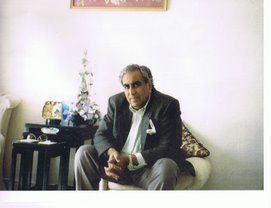Ahmad Bakhsh Sindhi was born to Haji Mola Bakhsh Sindhi and his wife, Saira Hazan in Bikaner, Rajasthan. Mr. Sindhi was primarily raised and educated by his mother because his father died when he was 8 years old due to choking on a bone.
In 1944, Mr. Sindhi was a gold medalist/top achiever during his Master of Arts and Bachelor of Laws studies at prestigious Aligarh Muslim University in the city of Aligarh in Uttar Pradesh, India. Subsequently, from 1944 till 1947, he became a lecturer in philosophy at Dungar College in Bikaner.
On June 6, 1945, Mr. Sindhi married Ameena Begum of Bikaner. They had a happy marriage which produced five daughters and one son.
[edit] Political career
Mr. Sindhi’s first political achievement was being appointed to the position of Cabinet Minister for the independent state of Bikaner by its Maharaja, Sir Sadul Singh, in 1948.
From 1949 till 1980, Mr. Sindhi practiced law in the Rajasthan High Court in Jodhpur's Zeb Manzil. He was known for feeding the poor there as well as his overall social work for the lower class in the area. One notable instance was his campaign to help people get housing instead of living on the street by the Sardarpura Cemetery.
During a 1971 debate regarding the Indo-Soviet Treaty of Peace, Friendship and Cooperation, Mr. Sindhi is cited to have tried to add the amendment to the treaty.
"...If any country invades us [India], we shall depend solely on our own defensive resources and will try to obtain as much aid from other friendly countries as possible"[1]
In 1980, he was elected to the Rajasthan Legislative Assembly (or Vidhan Sabha), representing the city of Jodhpur, India. Soon after, Mr. Sindhi was named Deputy Speaker of the Rajasthan Assembly for one year.
It was in 1983 when he reached the pinnacle of his political career, when he became Law and Justice Minister in Shiv Charan Mathur’s ministry by Indira Gandhi. He retained this position until March 1985.
[edit] Life After Politics
Mr. Sindhi spent the next few years of his life alternating between life in India and in the US to visit his children and grandchildren. By 1994, he eventually settled down in the US, living with his wife and their son.
After a strenuous time living with his son, Mr. Sindhi had a cardiac arrest in 2000, and was taken to William Beaumont Hospital in Detroit. He died on April 28, 2000 from complications of his cardiac arrest. At his bedside was his daughter, Naseem Salim.
[edit] Sources
^ Radhan, O.P. (1998). Encyclopaedia of Political Parties. New Delhi: Anmol Publications. pp. 2868. ISBN 8174888659.
This article about an Indian National Congress politician is a stub. You can help Wikipedia by expanding it.
Retrieved from "http://en.wikipedia.org/wiki/Ahmad_Bakhsh_Sindhi"
Categories: People from Bikaner Rajasthani politicians Indian Muslims Indian National Congress politician stubs
Hidden categories: Orphaned articles from February 2009 All orphaned articles Articles lacking in-text citations from January 2009
Saturday, May 02, 2009
Subscribe to:
Post Comments (Atom)
SANA KIDS.. Mour tho Tille
Gulshan Kodwani
Jawad Shaikh
Noor Ahmed Lakho
Sara Qalbani
Ahmad Qalbani
Poornima Kodwani
Mahreen Lakho
Cameran Vakassi
Krishna Kumar
Moomal Shaikh
Ranjana Kodwani
Gipsy Palace.. Sindhi
....
"The Gipsy Palace" at Maison Folie Moulin, part of festival Bombaysers de Lille. Where we presented a residence of 20 days to showcase and experiment all potentials from a strong 15 members group from The Sayari Circus from Udaipur. Dancers, musicians and performers who not only performed, but gave workshops of dance, music, tribal fashion and pictural arts.
On the performance side, Philippe Tapp, a director of Sayari Entertainment, decided that a show would never be twice the same, and the experience from the first till the last day at the Gipsy Palace would be a continuous journey of complete improvisation and experimenting every day with a different show concept, content and set up.
A true experience for both audiences, artists and technical team at Moulin !


No comments:
Post a Comment